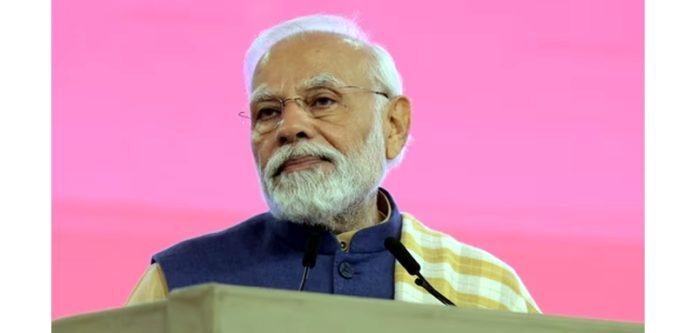‘Record growth & tourist inflows in UT now’
* Govt vacancies being filled in transparent manner
NEW DELHI, Dec 12: Prime Minister Narendra Modi has said that the last four years in Jammu and Kashmir have been marked with a renewed faith in grassroots democracy, with development, democracy and dignity replacing disillusionment, disappointment and despondency.
In an opinion piece which appeared in several newspapers today following the Supreme Court upholding the validity of the Government abrogating Article 370, Modi noted as to how as a BJP member associated with the issue for many decades he had developed a nuanced understanding of the specifics and complexities involved.
The Prime Minister said he was crystal clear about one thing that people of Jammu and Kashmir want development and want to contribute to the development of India based on their strengths and skills.
They also want a better quality of life for their children – free from violence and uncertainty, he noted, adding his government gave primacy to three pillars of understanding citizens’ concerns, building trust through supportive actions, and prioritising “development, development and more development”.
With its verdict, the Supreme Court has strengthened the spirit of ‘Ek Bharat, Shreshtha Bharat’ and has reminded us that what define us are bonds of unity and a shared commitment to good governance.
“Today, every child in Jammu, Kashmir and Ladakh is born with a clean canvas, where he or she can paint a future full of vibrant aspirations. Today, the dreams of the people are no longer prisoners of the past but about possibilities for the future. After all, development, democracy and dignity have replaced disillusionment, disappointment and despondency,” he said.
Earlier, women, SCs, STs and marginalised sections of society were not getting their due while the aspirations of Ladakh were ignored, he said, asserting that August 5, 2019 changed all that, a reference to the momentous decision of nullifying Article 370 and carving out two Union territories from the state.
All Central laws are now applied in the region without fear or favour, he said. “Representation is also more widespread – a three-tier Panchayati Raj system is in place, BDC elections have been held, and refugee communities who were all but forgotten have begun to enjoy the fruits of development,” he said.
Through its judgment, the court has upheld the sovereignty and integrity of India, he said.
He said the SC has rightly observed that the decision was taken to enhance constitutional integration and not disintegration. The court has also recognised that Article 370 was not permanent in nature, he added.
The breathtaking landscapes of Jammu, Kashmir and Ladakh witnessed the worst forms of violence and instability in the last seven decades.
The Prime Minister blamed centuries of colonisation, most notably economic and mental subjugation, for India becoming a “confused society of sorts” which instead of taking a clear position on basic things allowed duality, leading to confusion.
Jammu and Kashmir became a victim of such a mindset as the then Central Government had a choice of making a fresh start for national integration but opted to continue with the confused approach even if it meant ignoring the long-term national interests, he said.
“It was always my firm belief that what had happened in J-K was a great betrayal – of our nation and of the people living there. It was also my strong desire to do whatever I can to remove this blot, this injustice done to the people. I have always wanted to work to alleviate the suffering of the people of Jammu and Kashmir,” he said.
In very basic words, Articles 370 and 35 (A) were major obstacles, and those suffering as a result were the poor and downtrodden, he said.
“They ensured that the people of J-K never got the rights and development that the rest of their fellow Indians did. Due to these Articles, a distance was created between people belonging to the same nation. As a result, many people who wanted to work to solve the problems of J-K were unable to even if they felt the pain of the people there,” he said.
Key Central Government schemes have attained saturation levels following the removal of the two Articles, he said.
Government vacancies, which were a den of corruption and favouritism, have been filled in a transparent and process-driven manner.
“Earlier, there was a question mark on the status of Jammu, Kashmir and Ladakh. Now, there are only exclamation marks about record growth, development and tourist inflows,” he said.
Noting the devastating flood which struck the Valley soon after he took office in 2014, Modi recalled that he went to Srinagar to assess the situation and announced Rs 1,000 crore as special assistance for rehabilitation, signalling our government’s commitment to supporting the people during crises.
“The same year, I decided not to mark Diwali in remembrance of those we lost in J-K and decided to be there on Diwali day,” he said, highlighting his decision to frequently send ministers to the region.
“From May 2014 to March 2019, over 150 ministerial visits took place. This is a record in itself. The special package of 2015 was a significant step in addressing the developmental needs of Jammu and Kashmir,” he said.
Sports initiatives were among measures to reach out to the youth, he said, and cited the example of talented footballer Afshan Ashiq who was part of a stone-pelting group in Srinagar in 2014 but with the right encouragement she turned to football and was sent for training. She excelled in the game. (PTI)


